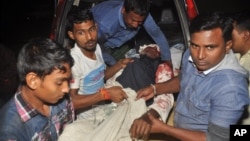Unidentified gunmen opened fire on worshippers inside a Shi’ite mosque in Bangladesh’s Bogra district Thursday evening, killing one man and injuring three others.
“The gunmen entered the mosque before launching the gun attacks. Four with gunshot injuries were immediately taken to a local hospital where one, the muezzin, died later,” Arifur Rahman Mondal, additional superintendent of police in Bogra, told VOA by phone. “We have already launched a countrywide operation to hunt out the assailants.”
The U.S.-based SITE Intelligence Group, which monitors online activities of radical Islamist groups, said the Islamic State extremist group claimed responsibility for the attack, which occurred 200 kilometers northwest of Dhaka.
The muezzin — the man who calls the faithful to prayer — was identified as Moazzem Hossain, 70. The three injured men were in critical condition, local TV channels reported.
Mohammed Ukil, a relative of the muezzin, said the assailants tried to blend in with the worshippers.
“When, during the prayer, the worshippers were prostrating, with their faces downcast, [the attackers] started shooting from the back. The men ran away when the worshippers shouted for help,” Ukil said.
The shooting was the second such attack on the Muslim majority country’s small Shi’ite community in recent weeks. A bomb attack hit a Shi’ite Muharram procession last month, killing two people.
Prime Minister Sheikh Hasina had harsh words for the attackers.
"A good Muslim can never resort to terrorism," she said. "The gunmen who attacked the worshippers at the mosque cannot be be called Muslim. In the name of religion, these perverts are killing people, indulging in terrorism and bringing bad name to Islam."
Rising militancy
The attack came amid concerns about the rise of militant Islamists in Bangladesh.
Between February and October, four secular bloggers and one publisher were hacked to death in Bangladesh. Police said they were slain by the Ansarullah Bangla Team, a local hard-line Islamist group.
In recent weeks, gunmen also killed two foreigners — an Italian aid worker and a Japanese farming expert — in two separate attacks in the country. The Islamic State group claimed responsibility for those attacks, as well as the bombing of the Shi’ite religious procession.
Despite the reported IS claim of responsibility, authorities in Bangladesh insisted that the extremist Sunni militant group has no foothold in the country. They blamed the opposition alliance led by Khaleda Zia’s Bangladesh Nationalist Party and its ally Jamaat-e-Islami for the attacks.
Earlier Thursday, police in Bangladesh said that Jamayetul Mujahideen Bangladesh, a banned local Islamist group, had carried out the attack on the Shi’ite procession. Police also said that during a raid Wednesday, officers shot and killed the JMB commander who had led the bombing attack. Officers also arrested five JMB militants suspected of involvement in the procession bombing and killed another commander during the raid.
Efforts to divide
About 96 percent of Bangladesh’s 149 million Muslims are Sunni, and the rest are Shi’ites. The two have lived together in harmony for as long as they have existed in the region, said Dhaka social activist Imran H. Sarker.
“Most of the Muslims participating in the Shia Muharram celebration are Sunni," Sarker told VOA. "We have never seen any enmity between the two Muslim sects in Bangladesh. The bomb attack on the Muharram procession in Muslim-majority Bangladesh came as a surprise to us.”
The attack on the mosque in Bangladesh triggered a wave of concern among Shi’ites in neighboring India.
Bilal Hussain, a Shi'ite community leader in New Delhi, said the mosque attack and last month’s attack on the procession appeared to be new attempts to create a divide among Muslims.
“The two recent attacks on the Shias in Bangladesh, including the one today, have shocked us," Hussain told VOA. "We have heard that IS claimed responsibility for the two attacks. This terrorist group is trying to drive a wedge between the Sunnis and Shias.”
Hussain is part of an India-based group that works in support of Sunni-Shi'ite accord.
“IS is trying to set the Sunnis against the Shias in Bangladesh. The group is Islam's enemy,” he said.











